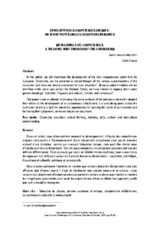Developper des competences civiques: un jeu de piste dans les champs disciplinaires
Developing civic competences: a treasure hunt throughout the curriculum
Autor
Mailhos, Marie-France
Editor
Universidad de Córdoba, UCOPressFecha
2017Materia
Citizenship educationCritical thinking
Debating skills
Cultural and intercultural understanding
Education du citoyen
Pensée autonome et critique
Compétences délibératives
Compréhension culturelle et interculturelle
METS:
Mostrar el registro METSPREMIS:
Mostrar el registro PREMISMetadatos
Mostrar el registro completo del ítemResumen
In this article, we will show how the development of the civic competences called forth by
European Citizenship, can be achieved at school through all the various subject-matters of the
curriculum and does not belong exclusively to ‘civic education’. Because subject-matters are not
identified in the same way across the Member States, we have chosen to regroup them under
generic headings: ‘scientific’, ‘linguistic and cultural’, ‘artistic’ and ‘conceptual’.
This paper is not an attempt at showing that some sections of the curriculum are better adapted
than others to the development of an autonomous critical mind; it is a rambling quest across the
curriculum to bring to light the wonderful opportunities for opening the minds of our students and
for honing their judgement, whatever subject we may teach. Dans cet article, nous allons montrer comment le développement, à l’école, des compétences
civiques nécessaires à l’épanouissement d’une citoyenneté européenne n’est pas le domaine
exclusif d’une discipline, comme par exemple l’éducation civique, mais peut être réalisé dans
n’importe quel champ disciplinaire. Dans les pays européens, les disciplines scolaires sont souvent
définies différemment. C’est pourquoi, par souci de lisibilité transeuropéenne, nous avons choisi
de regrouper nos réflexions autour de 4 grands domaines disciplinaires : approches scientifique,
linguistique et culturelle, artistique et conceptuelle.
Nous n’avons nullement l’intention de montrer que certains domaines disciplinaires sont plus
efficaces que d’autres quand il s’agit de développer une pensée autonome et critique ; nous
voulons tout simplement effectuer un parcours parmi les savoirs scolaires pour mettre en lumière
les magnifiques opportunités pour ouvrir les esprits de nos élèves et affiner leur jugement, quelle
que soit la discipline enseignée.

